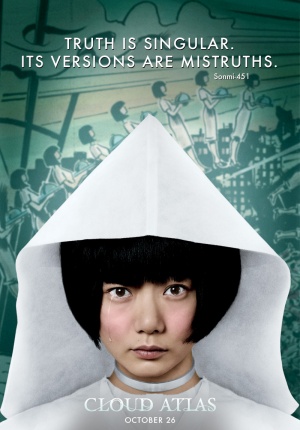Release Date: October 26th, 2012
MPAA Rating: R
Directors: Andy Wachowski, Lana Wachowski and Tom Tykwer
FilmPulse Score: 5.5/10
Cloud Atlas is an epic, sprawling film adaptation of David Mitchell’s novel of the same name that features an ensemble cast playing various roles across different times, countries and, even, genders. It is a story that tries to enlighten the viewer to the idea that our lives our not our own and our actions affect the past, present and future. That one lone humanitarian act has the ability to reverberate throughout history, as well as nefarious ones. Andy and Lana Wachowski (The Matrix Trilogy) and Tom Tykwer (Run Lola Run) are tasked with bringing this audacious work of contemporary fiction to the big screen and, for the most part, they succeed.
The film consists of six seemingly separate storylines starting in 1850 in the Chatham Isles, then to 1931 Belgium, San Francisco in the 1970s, present-day England, a futuristic Korean city – Neo-Seoul and finally to a post-apocalyptic Hawaii (because every story needs a post-apocalyptic setting). The film inter-cuts between these stories, and actions in one point of history affect the actions in another, and so on. As one can assume, to tell these six stories, the directors need a good bit of time to appropriately tie everything together and they do. They meander through these six tales involving acts of kindness, betrayal, oppression and greed in a mere 172 minutes. It makes sense, it is an epic film, just not an entirely engrossing one.
As stated before, all of the actors play a plethora of characters throughout this film, crossing between different eras, ethnicities and genders. The makeup and performances in this aspect is the film’s highest achievement; trying to discern who is who in each storyline and seeing the actor themselves enjoying the freedom of these roles was enjoyable (whether it be Tom Hanks playing a gritty, hooligan-type British writer or Hugo Weaving in drag playing the no-nonsense, elderly abusing Nurse Noakes). Halle Berry dons white-face (if that’s a thing) in 1931 Belgium, Jim Sturgess and James D’Arcy both play men of Asian descent, while Doona Bae gets to play both a Caucasian and a woman of Mexican descent. This film has just about everything – Hugh Grant as a cannibal, actors in drag (Weaving and Ben Whishaw), a bi-sexual composer, assassins, white-face, yellow-face, Keith David, Hugo Weaving as a green-skinned, top-hat wearing apparition, Jim Broadbent and a post-apocalyptic Hawaiian tribe with stunted language skills for whatever reason, True True.
The core of all of these narratives is a simple message that has been covered time and time again – history repeats itself. We keep making the same mistakes over and over throughout history until finally at the end someone has the courage to break the cycle. The film manages to deal with slavery, nuclear power, big oil companies, capitalism, the power of love, the power of kindness and redemption. It feels like this film, or more appropriately the novel, tries to tackle too many things without really having much to say. All of the storylines and characters being presented in such a complex, sprawling web comes across as smoke and mirrors; using an epic conceit to deliver a rather simple idea.







